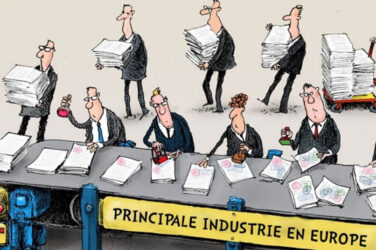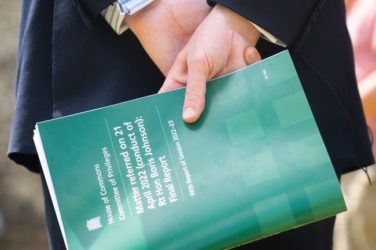Its just over 400 years since a small group of Quakers landed on the shores of what came to be called New England. Their unabashed aim was to establish a type of society radically different both from the place they had left (England) and indeed from more or less anything else that then existed in Europe. A certain concept of freedom, one which actually contained numerous prohibitions and was inseparable from God and Divine Laws, was at the core of their beliefs. Paradoxically, the group retained strong links with England for much of the 17th and 18th centuries, until the long War of Independence liberated them from tax and other burdens established in London. And it was then that a justly famed set of home grown thinkers began to conceive a radically different form of government, enshrined in a remarkably brief Constitution containing just seven articles.
From that beginning, citizens of the USA have been groomed to consider their country, and indeed themselves, as exceptional. While some countries in Europe, especially France and UK, might try to vaunt self-styled “revolutionary values” or “the rule of law and parliamentary institutions”, Americans knew that only they placed the individual and the person’s rights at the very center of their society and government. The “Démocratie” which de Tocqueville praised so warmly from his American travels a half century after the country had been established, was in fact a sui generis approach to protecting the notion of freedom as conceived in the Constitution. No matter that this concept of freedom eliminated large swathes of the population, and talked only of a very narrow band of rights. Freedom as a virtually unlimited scope of action for those recognized by the Constitution was the core idea.
Seen in these terms, the gulf between the huge array of governmental systems observed in European countries and what exists in the USA should not be a source of surprise. When, in the mid-19th century, John Stuart Mill described his understanding of liberty, he was in fact propounding an idea that fundamentally clashed with American core values. Ever since then, the two continents have grown further apart in the realms of political philosophy and practice. To assert that they somehow belong to the same club is, to put it very mildly, stretching a point. Geopolitical and geo-economic interests can certainly coincide, and have frequently done so. But it is a serious illusion to think that there is any kind of common thinking in other areas. The indiscriminate use of words like “democracy”, “elections”, “rights” and so on, which suggests that people are using the same language when in fact they are referring to entirely different things, merely obfuscates the problems still further.
It is through this lens that some of the controversies dominating headlines today need to assessed. The institutional and legal structures developed over time in USA have generally sought to preserve the “originalist” aims (periods such as the FDR years have been seen as sharp deviations from the acceptable, and subsequent norms have been developed to ensure they do not recur). In the sharpest contrast to elections in virtually all of Europe, in the USA the ballot box is a vast entity through which all kinds of matters pass. Magistrates, for instance, must be elected and re-elected by those qualified to vote – any magistrate offending the political powers that be is taking an almighty risk with their job. Any broad election call, such as a vote on the Presidency or a mid-term for the House and Senate, will be accompanied by a large number (often over 100) of other subjects on which voters are asked to state their opinions. In effect, there are multiple referendums occurring at the same time as people are being voted for office. The content of those referendums will depend on the individual State concerned – things must be seen to be as local as possible. “Those qualified to vote”, goes the phrase. From which it follows that a key determinant of results is the way in which such people are determined. Certainly no European country is free from the gerrymandering and qualification manipulations that this phrase implies, but in the USA those dark arts have certainly been developed to a high degree.
As with European countries, the USA has been forced (through its own dynamism) to engage in a never ending and ever expanding struggle with its own contradictions and hypocrisies. In the religious sphere, the principle of freedom has had to accommodate an explosion of credos of all sorts, many of them in fierce opposition to each other and uncomfortably associated with the entrepreneurial flair of their inventors rather than the immanence of the Lord, who surely has no competitors. The so-called free market has shown worrisome tendencies towards cartels and monopolies. While freedom logic should say that these are no problem, nevertheless a huge industry called anti-trust has developed (run largely by lawyers, who of course themselves practice restrictive behavior on a major scale). To retain “freedom” in the economic related sphere, we have lived through decades where industries and professions have endlessly campaigned (largely successfully) for self-regulation through their own “codes of conduct”. Common sense suggests that such ideas border on the oxymoronic – and experience has revealed their poverty.
This ferocious battle between exceptionalism buttressed by originalism, and the incredible inventiveness of American entities and people, reaches its fullest expression when the issue of what people can and cannot do is at center stage. While in so many dimensions of science and life, an American would instinctively oppose putting restrictions on introducing new things (“impeding progress”), when it comes to behavior of the individual, the tables are suddenly turned. What is or is not to be permitted becomes simply a matter of political preference. To cloak this in other terms (and this goes for all the points of view) is disingenuous at best and dishonest at worst. So let’s talk abortion and a woman’s control (or lack of it) over her own body.
In his brief for the majority opposing the decision in Roe v Wade, Justice Alito talks at the very beginning of there being little discussion (presumably meaning legal discussion) in the USA of some sort of abortion acceptance before around 1868. That statement can certainly be challenged, but let it go. The simple fact is that throughout history abortion has been practiced in every society. Often the people demanding abortions be carried out were men, especially in families classified as “royal” or “noble”. On occasion the method chosen was murder of the woman carrying the child. So nobody is discussing what happens – the issue is how it happens. Now there has been a trend across the world for societies to try and offer greater safeguards, health wise, finance wise and law wise, for citizens to be assisted to the maximum to make individual choices in matters pertaining to their health. Powerful forces in US society oppose this trend. Why? In essence because they wish to underline the country’s God supported exceptionalism. Curiously, among well known religious groups, it was the Vatican ( a State conspicuously unloved in USA) which applauded the Supreme court ruling while other denominations have been low key (a matter of some embarrassment to President Biden, known for his links with the Vatican).
The majority ruling relies quite significantly on the argument that policy towards abortion is a subject for individual States to decide, not something which should come under Federal law. Hence the very fast developing split among States of the Union, a phenomenon which will no doubt produce acrimonious disputes in the immediate future. That split, in turn, is almost bound to bring about calls from originalists for a Federal prohibition on abortion, something which would require a decision by Congress. Following which, the Supreme court should (were logic to prevail) be faced anew with the Federal/State law conundrum – but this time coming from the opposite direction.
We have been talking about rights. Let’s be clear. At any given time, the authorities in the USA have the right to do whatever they want to do, and to do that by any means that they choose. In so acting, they can preserve their proud claim to be exceptional. For countries elsewhere, it is essential to see this clearly for what it is. By all means make geopolitical and other accommodations with the USA if it suits you. But don’t confuse that with some nebulous idea of “shared values” or similar poppycock. The USA has never been in the fold – and its distancing itself more as time goes by.
Peter O’Brien 27 June, 2022





